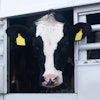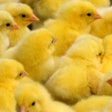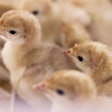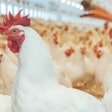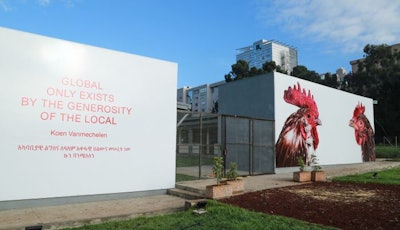
Chicken farmers in Ethiopia may soon benefit from the work of a new poultry genetics research center that opened this year.
The facility, known as Incubated Worlds, will help the country’s poultry farmers overcome local production challenges, primarily through applying genetic technologies to quickly improve local chicken breeds.
The facility has been set up as part of the continent-wide African Chicken Genetic Gains project, established in 2014 to tap the genetic diversity found in poultry and to provide more opportunities for rural producers, and led by the International Livestock Development Institute (ILRI)
The facility has been developed primarily as a response to food insecurity in the region, but the various activities that will be carried out there, the ILRI hopes, will make the subject of livestock diversity engaging and stimulating.
“Of all livestock, poultry production can be scaled up to meet household nutritional needs far more affordably and sustainably than other types of farm animals,” says ILRI Director General Jimmy Smith. “We want our poultry work in Ethiopia to serve as a model for how livestock can be a source of economic growth and prosperity and a way to improve household incomes and nutrition.”
Direct learning
Part of the work at Incubated Worlds involves bringing in farmer associations to study more efficient breeding practices and to learn about the latest improvements in feeding and raising chickens to help them develop and grow viable poultry businesses.
More than 60 percent of Ethiopian households already keep poultry, and family production is seen as key to responding to rapidly rising demand for poultry products in the country.
The ILRI notes that poultry research is integral to its approach to developing and scaling up interventions, and it is hoped that improved poultry genetics, breeding and feeding will offer opportunities to transform backyard poultry farming into a thriving market-orientated business, not only providing food but raising incomes, generating employment and foreign exchange earnings.
Incubated Worlds has a reach extending further than Ethiopia alone, and work at the facility will be closely connected to the poultry genomic program jointly administered by ILRI, Scotland’s Rural College and the University of Edinburgh in their collaborative Centre for Tropical Livestock Genetics and Health.
Gebregziabher Gebreyohannes, representative of the Ethiopian government at the official opening of Incubated Worlds, commented: “We are proud that the facility will not only host Ethiopian chickens and provide a quality research facility, but that it also displays the first DNA sequencing undertaken of one of Ethiopia’s indigenous birds -- a wonderful illustration of collaboration between the Ethiopian Institute of Agricultural Research and ILRI.
“Being able to unpick the genetic code of indigenous chickens will significantly improve understanding and use of their genetic diversity to the benefit of our country. This knowledge will provide unique opportunities to understand, monitor and strengthen the resilience and productivity of these chickens in a sustainable manner.”

Africa’s poultry sector has the potential to strengthen the empowerment of the continent’s women, who are already heavily involved in chicken and egg production. | ILRI
Unusual feature
The genetics facility contains an art installation which, it is hoped, will educate farmers in a way that science alone could not.
The center has worked with Belgian artist Koen Vanmechelen who, over the past 20 years, has created 20 generations of chickens that combine traits from breeds from around the world.
This cross-breeding project has resulted in a bird that Vanmechelen calls the “Cosmopolitan Chicken,” and which is said to be a treasure trove of traits.
The art installation aspect of Incubated Worlds includes photographs, videos and books offering insight into the complex genetics of Vanmechelen’s work and of Ethiopian chickens.
Meeting rising demand
Ethiopia is Africa’s second most populous state, with one of the region’s largest livestock sectors. The country's demand for milk, meat and eggs, for domestic consumption and export, is rising rapidly.
As part of efforts to meet this rising demand, the country’s livestock master plan has identified poultry’s huge untapped potential.
With the improvements that are being introduced through genetics, feed and the provision of animal health services, it has been projected that, over the next five years, poultry and egg production in the country will grow by approximately 200 percent and 800 percent, respectively.

The art element of the facility will help to engage farmers and make education easier than simply relying on science. | ILRI

